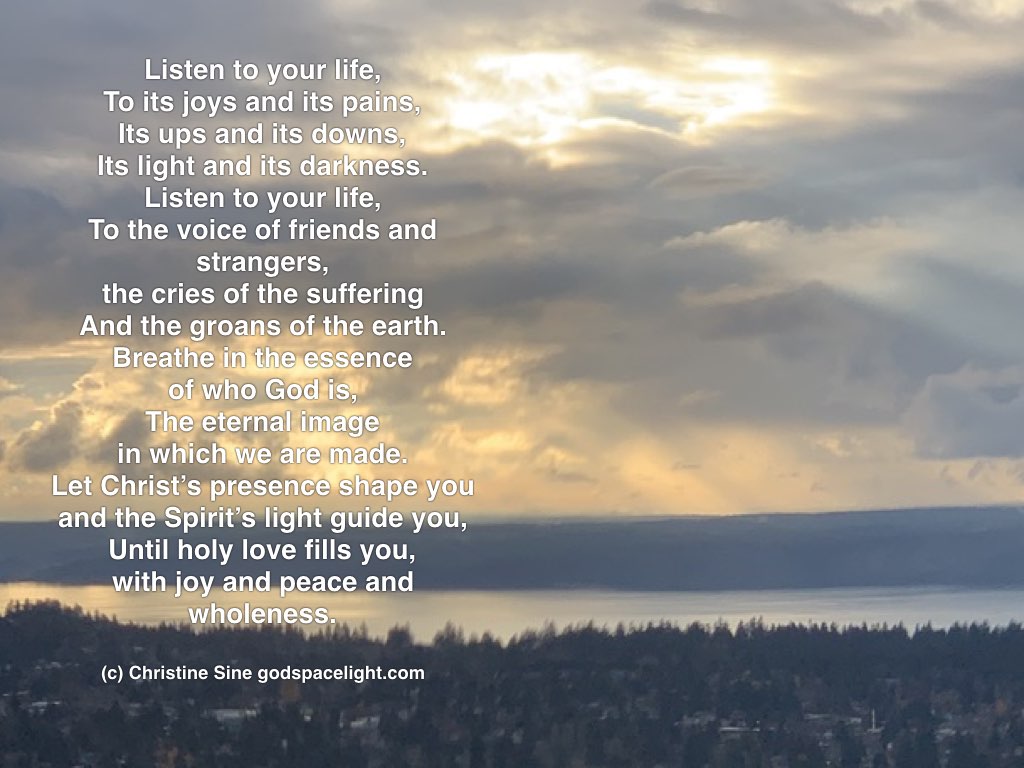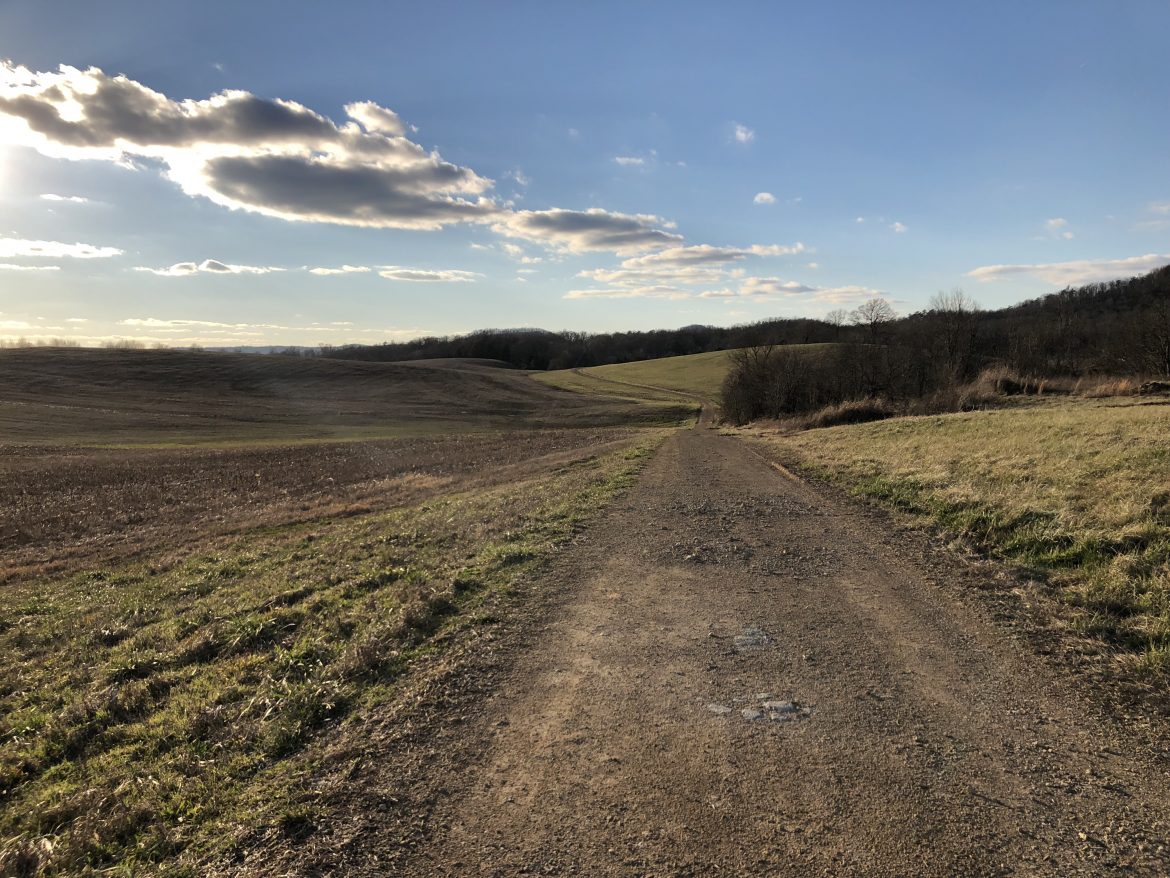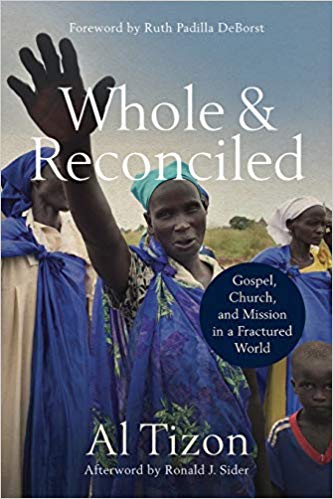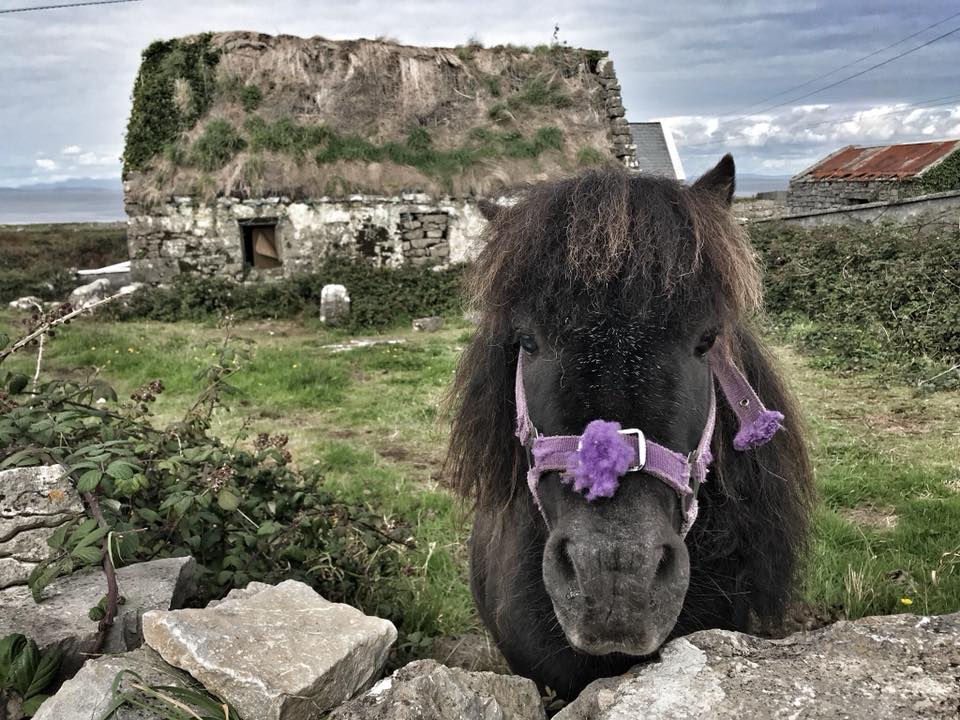by Rev. Brenda G. Warren
ST. ITA OF IRELAND AND WHAT GOD LOVES BEST
c480AD- January 15, c570AD
Faith in God with a pure heart
Simple life with a religious spirit
Generosity with Love
As we are on the threshold of the third week of this new year, we have been bombarded on social media and television with the call to eat nourishing food, lose some excess weight, and begin exercising once again. Some of us may be still faithfully following our New Year’s resolution, but I would venture to guess that quite a few of us have already lapsed and we likely feel a tinge of guilt.
Another resolution, equally, if not more important and often overlooked for this New Year is the call to listen to the Spirit to nourish our soul and to discern what we are being urged to do this year, to do what God loves best.
St. Ita of Ireland might have a soul-resolution suggestion for us. But who is St. Ita?
Icon of St Ita
Who Is St Ita?
St. Ita was a saint living in the western part of Ireland in the fifth century. She was a daughter of the King of the Déisi in Ireland and is the patron saint of Munster. Ita was baptized as “Deirdre,” but was given the nickname, Itha meaning “thirst” because of her thirst for God. Óengus, considered to be the first King of Scotland described her as “the white sun of the women of Munster.” We can assume that is a compliment!
As a sixteen-year-old, legend has it that Ita was led by three heavenly lights to the place where she would become the founding Abbess of the first known monastery in Western Ireland. This monastery was appropriately named Killeedy Monastery, meaning “Church of Ita” Monastery in Limerick.
Abbess Ita’s monastery was a Celtic-style monastery, meaning that both women and men lived on the same monastic grounds serving and worshiping together under the rule of an Abbess. Her community of faith gave their lives to teaching the young and compassionately caring for the sick, the poor and the elderly. In addition, the community also tended their dairy farm at Cnoc Uí Choileáin (modern-day Mountcollins), at the border between County Limerick and County Cork.
The Killeedy Monastery also established a school for boys and girls. One of Ita’s most famous pupils was Brendan (later known as St. Brendan the Navigator) to whom Bishop Erc gave to Ita to care for when he was just a year old. Brendan stayed at Killeedy until he was six years old. Ita’s influence upon this future saint was so impressionable and “motherly” that he continued to stay in contact with her throughout his life and visited her between his voyages and always deferred to her counsel.

Classic Celtic triad
Like the Celtic Druids, Ita taught in triads. Brendan is said to have asked her what three things God loves best and she answered in a Celtic-type triad: Faith in God with a pure heart; Simple life with a religious spirit, and Generosity with love. Ita also told Brendan the three things God most detested were a scowling face, obstinacy in wrongdoing, and too great a confidence in the power of money.
The powerful and prevalent influence of Abbess Ita on not only Brendan the Navigator, but also among Ireland’s saints bestowed upon her the title “Foster Mother of Irish Saints.”
As we go forth into this new year, may we too like St. Brendan the Navigator incorporate Ita’s teaching on what God loves best into our lives. May this simple Celtic triad teaching be a nourishment to our soul throughout this year.
- Faith in God with a pure heart
- Simple life with a religious spirit
- Generosity with love
For more information on St. Ita of Ireland and St. Brendan the Navigator, please click on their name. I have written about both of these Irish saints along with thirty-eight other Celtic and Anglo-Saxon saints in Celts to the Crèche, a 40 days of Celtic Advent online devotional.
Rev. Brenda G. Warren is an ordained pastor in the Christian Church (Disciples of Christ). She is married with two sons, a daughter-in-love, and two Maine Coon cats, who of course have Celtic saint names. She currently serves as an Interim Pastor.
by Christine Sine
When you do things from the soul
you feel a river moving in you
a joy (Rumi, Moving Water)
Last week our associate rector Danae Ashley handed out star words. It was part of her sermon for Epiphany. She had a whole basketful that circulated around the church until we each had one. She encouraged us to take our stars home and use the word as focus for the coming year, allowing God to speak to us through our contemplation.
My word was DEPTH.
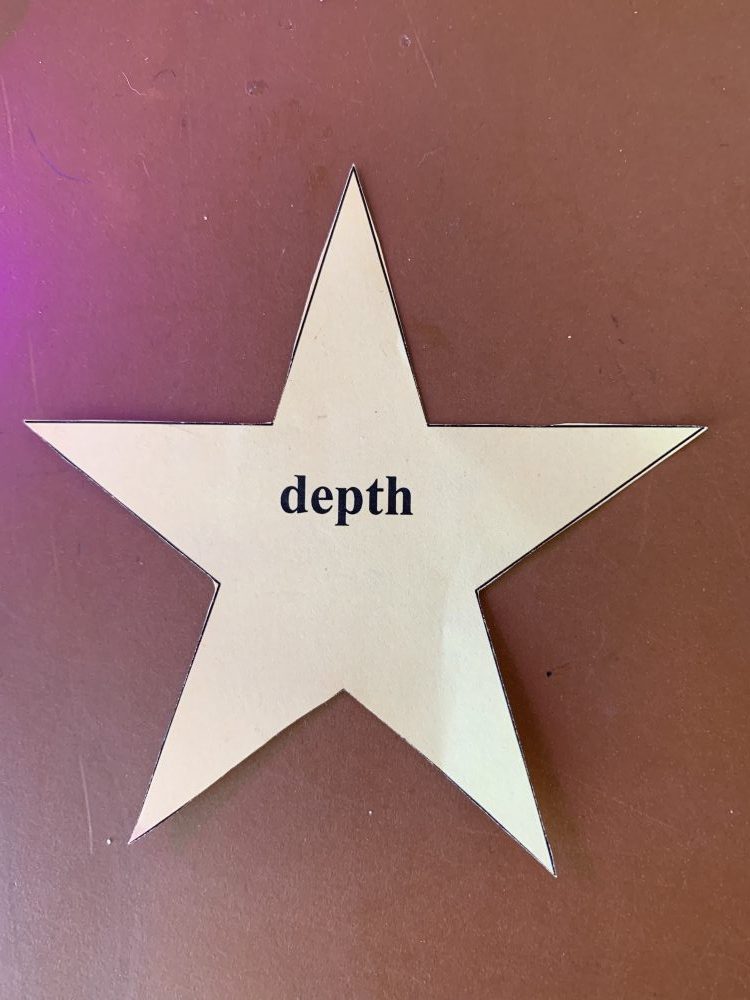
Star word
At first I wasn’t sure what to do with it. After all, as I expressed in my new year’s prayer, I already had my phrase for the year – Newness beckons . Yet the word DEPTH wouldn’t leave me alone so I didd what I always love to do in a new season of the liturgical calendar, I created a garden, with the epiphany star at its center.
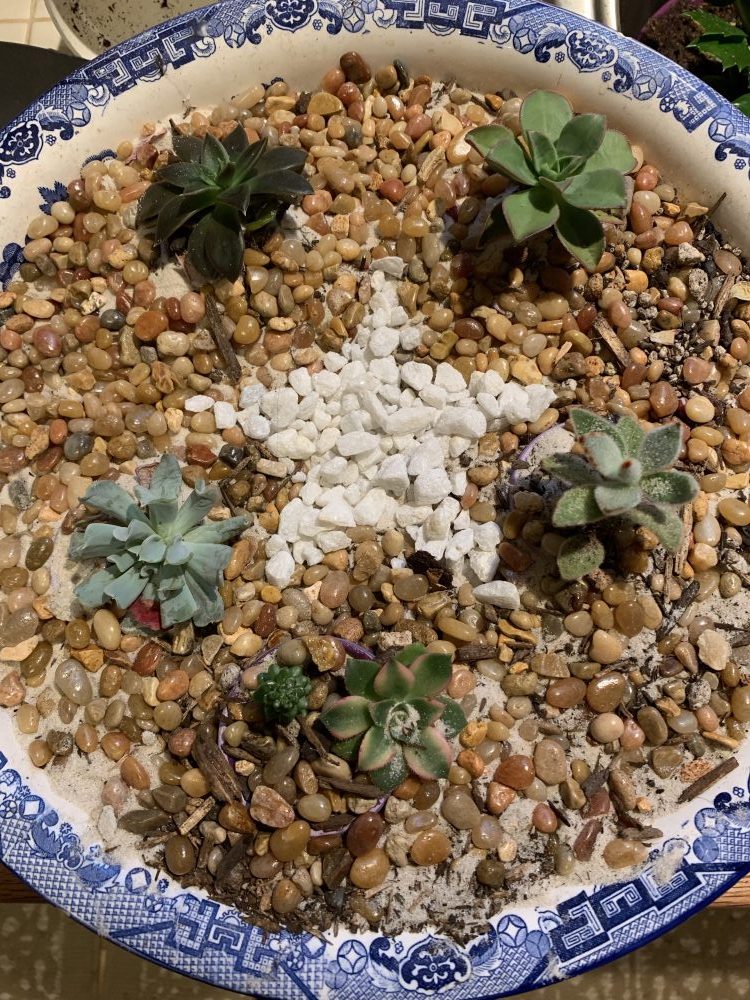
Epiphany garden
Then I remembered Christine Valters Paintner’s words in her post Embracing Mystery in Discernment:
What if the season ahead wasn’t about growing more certain about things but about releasing the hold of your mind so something deeper and more fertile could arise.
I sat in silence, letting go of my expectations and preconceived ideas and God spoke:
Go deeper – into the mystery of God, into love, intimacy, compassion, listening, vulnerability. Let the promise of newness beckon you towards new depths in God.
So I pulled out some rocks and my paint pens. Each day over the last week I painted a rock to add to my garden and wrote down what I felt God said.
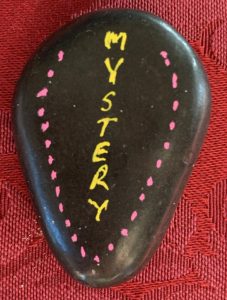
Embrace mystery
Embrace the mystery of not knowing who God is, what is doing or where your journey will take you.
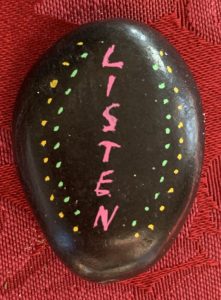
Listen carefully
Listen carefully to the voices of friends and strangers, to the stories unfolding in the news and on social media. Be sensitive to the wind of the Spirit blowing through unexpected places and unlikely people.
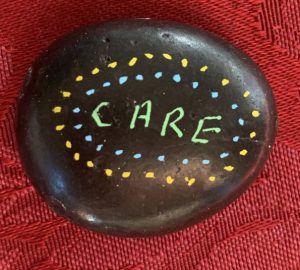
care passionately
Care passionately for the marginalized, the excluded and the misunderstood. Care passionately for our sick and suffering creation.
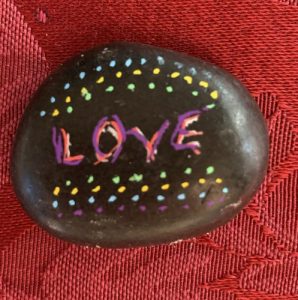
Love unconditionally
Love unconditionally those who think differently from you. Love those who abuse you. Love all the colors of the rainbow.
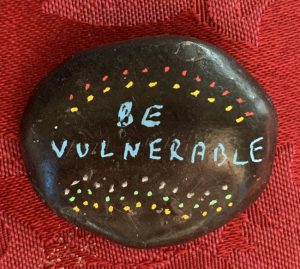
Be vulnerable
Be vulnerable. Do not harden your heart when life is challenging and people mistreat you.
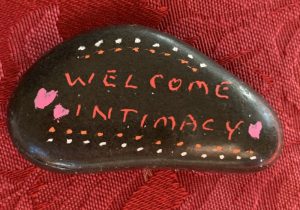
Welcome intimacy
Welcome intimacy with God. Allow the sweetness of God’s presence to penetrate those closed off places where you have not invited the divine presence to enter. True love doesn’t intrude but “speaks in a voice gentle enough for us to ignore.” (Rich Weyls rector St Andrews)
I have felt this week that my daily meditation bubbled up from the depths of my soul, bringing with it the truth that God has already hidden within me. What Merton calls “the hidden wholeness”.
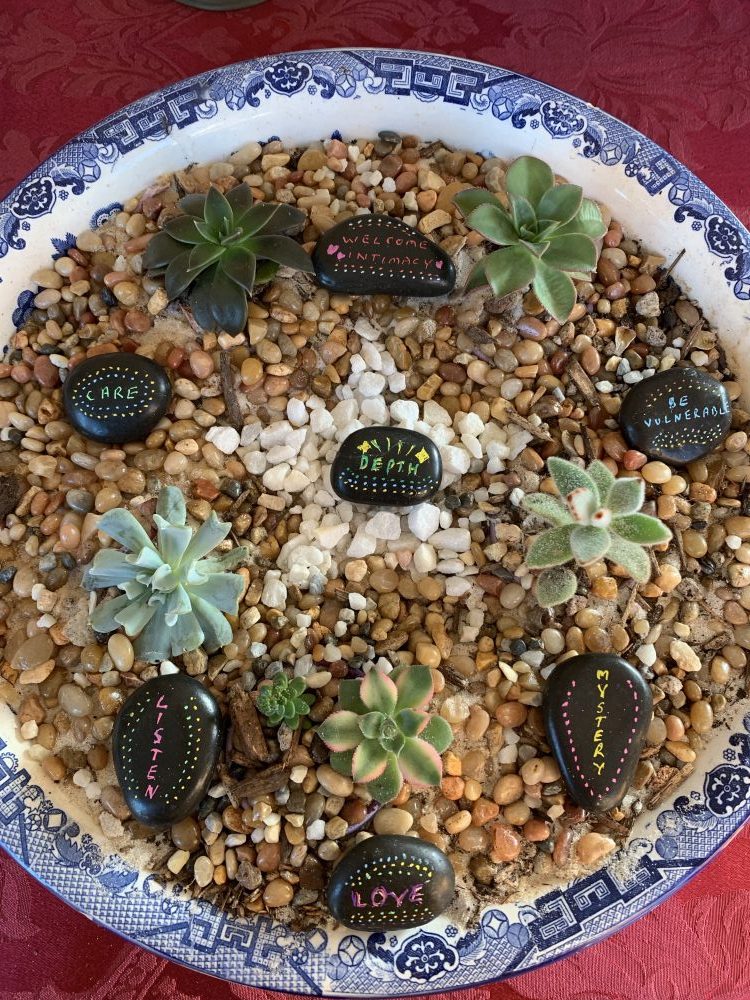
epiphany garden
My new garden sits on my desk and will do so throughout the season of epiphany, this season of discernment in which I am sure God will continue to speak to me.
What is your response?
Perhaps you would like to adapt the process I have used this week. Get together with some friends. Sit silently for a few minutes allowing the Spirit of God to anoint each of you. Get each person to write a word on a piece paper. You might like to do this several times. Place the words in a basket and prayerfully have each person choose a piece of paper without looking at the word on it.
How could you use your word as a focus for meditation and prayer throughout the coming season?
By Lilly Lewin
Welcome to 2019. It’s seems like we were just learning to write 2018 and now it’s time to flip the calendar and start a brand new year! I’m thankful for that. I don’t know about you, but last year wasn’t my favorite.
I had all of these expectations, all these great plans and hopes for productivity, and most of them didn’t happen. Sadly, I felt like the hopes and dreams that I started with at the beginning of 2018 really never got very far.
How about you? How was 2018?
My friend Carrie Larson, asked this on her Instagram,
“What is one word you would use to describe your last year? “
The word that popped into my head was FRUSTRATING!
Not exactly a positive word for the year. And not exactly what I’d hoped for my 2018.
But it reminded me of the need I have to look back at the year and see what really happened, before I make a start taking the road into the new one.
Too often we rush right into the New Year and plunge into activities and busyness and race down the road. We don’t take time to look back and see what God has been doing in our lives. We too often don’t stop and see what we’ve learned and where we’ve been. I’ve found that stopping and taking time to reflect on last year can help me have a better start to the new one.
TAKING TIME TO REVIEW THE YEAR. It’s a PRACTICE that I’ve been doing for the past several years and it started at the Abbey of Gethsemani near Bardstown, Kentucky. I am blessed to get to retreat there in silence, going away on a Monday
coming back home on Friday evening. And in the silence I reconnect with Jesus and myself. I will write more about practicing silence in the next week or so, it’s also a great practice to practice. But you don’t have to be at a monastery or on a silent retreat to start this Practice of Reviewing your year. My friends Cindi Slaughter was house sitting for a friend last week, and being in a different place with a time of quiet allowed her to have the time to reflect on 2018 and look towards 2019. My friend Fran started her review of 2018 by looking over her photos in her phone during our journaling time at our thinplaceNASHVILLE gathering on Sunday night. The hardest part is starting!
HOW TO BEGIN…
Set aside TIME…. a few hours, yes a couple of uninterrupted hours, will help you look back at the entire year. If you can do a half a day, or a whole day, all the better. That will give you more time to reflect on the year and time to pray and sit with what you see and notice. Or you could plan to spend some time each day in the week to come to look back over your 2018.
Get somewhere without Distractions, where the kids, the laundry, or Netflix are not calling your name.
Gather your SUPPLIES: I start with my calendar and my cell phone, and I use different colored post it notes and sharpie markers. If you journal, you can use your journal to look back on your year.
Throughout the year, I take lots of photos on my phone. Looking back through my photos jogs my memory and gives me a visual library of what’s happened.
The pictures help me remember things that my calendar may not show.
LOOK AT THE CALENDAR. I use post it notes to create a visual calendar of what took place during the year.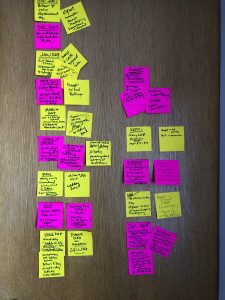
Since I’m doing this on retreat, I leave the post it notes up for a few days so I can add to them and see what I’ve missed, and review what God has been up to in my life. And I take a photo of the notes so I can remember what I learned.
If post its aren’t your thing, you might use your journal or a pad of paper to make a list going month by month.
Put down places you went, work projects, people with whom you met, friends who came to visit, milestones, etc.
Doctor visits, vacations, celebrations and funerals all make up our year.
You can also list any emotions, feelings, memories that you have about each month or season.
What do you Notice?
What are the trends? What are the gifts?
Anything missing?
How have a I spent my time? Usually I see just how much I’ve been doing, how busy I’ve been with work and travel, etc and I finally figure out why I’m so tired.
By looking at all the post it notes, I can see things I’ve forgotten.
I can see things I’ve been holding on to that have made me angry, frustrated and depressed.
I can see the things I’ve forgotten to be thankful for! The gifts God has given me!
This week I went back even farther than 2018. I looked back at 2017 too. I felt like there were some things that took place in 2017 that affected 2018. There was lots of hosting and hospitality in 2016 and 2017, and I think that led to less in 2018.
My dad had heart procedures at the end of 2016 and 2017 that also ended up being a big part of 2018. I’ve learned a lot about cardiology in the past two years. And in 2018, I discovered a heart issue of my own got me exercising consistently and eating well for the first time in over 25 years!
I realized we went from a geriatric cocker spaniel in 2017, to a very active toddler in a golden doodle who is now twice the size we expected him to be! While Jake has been great for my exercise routine, his addition has been a much bigger disruption than I’d planned or expected.
I also noticed that I spent a lot of time helping others fill up their cups and connect with God, but i didn’t do a great job of filling up my own cup. I made a list of ways I’m planning to find refreshment and connection in the New Year.
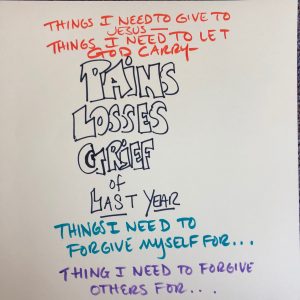 I saw gifts of friendship, gifts of beautiful places, and lots of laughter that I need to remember and celebrate and carry forward into 2019! But I also took the time to make a list of the things that I needed to give to Jesus to carry. The pain, the loss and the grief of last year. And this included things I need to forgive myself for and forgive others for so I don’t drag that baggage any further down the road!
I saw gifts of friendship, gifts of beautiful places, and lots of laughter that I need to remember and celebrate and carry forward into 2019! But I also took the time to make a list of the things that I needed to give to Jesus to carry. The pain, the loss and the grief of last year. And this included things I need to forgive myself for and forgive others for so I don’t drag that baggage any further down the road!
The beautiful thing about 2019 is that the road is long! We don’t have to hurry. We have time to PRACTICE and to review and take a look back, and we have wonderful days ahead to journey into the new adventure of the New Year with Jesus. And I’m very grateful that He’s got the map! 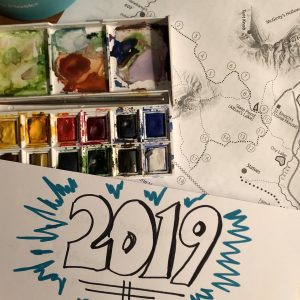
by Christine Sine
I have a canvas print of this prayer, which sits on my office desk, a frequent reminder for me to sit quietly and refocus myself on the presence of God. I try to pause at least 3 times a day for a quiet moment of re-centering and prayer.
This is not the first time I have posted this prayer. However I am finding it very helpful in this season and as we live in a time of high anxiety, fear and a sense of being overwhelmed, I thought you might like to try it too.
Sit with your feet planted firmly on the ground.
Close your eyes for a moment and take some deep breaths in and out.
Relax into the presence of God.
Read the prayer through slowly.
Close your eyes and sit in the presence of God repeating the line “I center myself on you today”
NOTE: If you are interested inpurphasing a canvas print copy of this prayer and photo please email me at seasickdoctor@gmail.com
by Christine Sine
I mentioned a couple of weeks ago in my post Discerning the Way Ahead that the place we need to start is by revisiting our theology. Al Tizon’s book Whole and Reconciled: Gospel, Church and Mission in a Fractured World, is one resource that I have used in the last couple of weeks to help me do that. I love Al’s emphasis on reconciliation, a message that is much needed in today’s world.
I hope you enjoy this interview with Al that I did recently about Whole and Reconciled .
What motivated you to write the book?
Reality and a question motivated this book. The reality of the increasing fragmentation of the world via racism, ethnocentrism, nationalism, tribalism, religiously-motivated violence, as well as senseless violence made me reflect much on the renewed need to see peace and reconciliation as central to the gospel. And the question that inspired the writing was, “Is the church at all in position to bear witness to the good news of peace and reconciliation in Christ in a fragmented and fragmenting world?” I know it is called to be peacemakers and reconcilers, but is it in a position to be so? If not, what must we do to realign ourselves in the Spirit to become what we have been called to be?
What did you enjoy most about the process?
“Enjoy” is not the first word that comes to mind when it comes to book-writing; though I know you well enough, Christine, that I totally appreciate the way you asked the question! For me, book-writing begins with a burden, a broken heart, an informed intuition I can’t shake. Writing is cathartic for me. Beyond that, I write with the hope that my words can lead others to live a meaningful life by participating in God’s mission with “bold humility.”
What one thing would you like readers to take away from the book?
That peacemaking in Christ is absolutely central to God’s whole mission in a divided, broken world. “Peace give I to thee. Not as the world gives, give I to thee. Peace give I to thee.” Sorry to break out in a classic Maranatha song, but that what comes to mind in answer to your question! Peacemaking cannot be relegated to the periphery. It cannot just be the task of pacifist Christians. It cannot be seen as the domain of only those on the left, vegan, Birkenstock fringe. Kingdom peacemaking must be front and center for the whole church as it lives out the Great Commission in the world.
On p31 & 32 you talk about the decentering of the church and the emergence of a truly global Christianity. Can you explain a little of what you mean
The church of the center, that is, a church that shares in the dominant power structure of society, is what is called Christendom. Part of what it means to be living in a post-Christendom world is that the church has been involuntarily pushed out of the center. As such, it has lost its privileged position and has found itself on the margins of society, bereft of the power to inform and shape as it once had. What I’m describing, however, is only the Euro- or white church; churches of color and churches that have emerged from traditionally missionary-receiving countries have never “enjoyed” the center. Black and brown churches have always been on the margins. In a post-Christendom age black, brown, and white churches are all on the margins together, giving us the opportunity to be truly the global mosaic of God’s people serving the poor, proclaiming good news to the lost, and speaking truth to power.
On page 80 you say Jesus testifies to the restoration of the shalom of God and we by the power of the Spirit must too. Can you share one example of where you see this happening?
My mind immediately goes to Pune, India where the Hindustani Covenant Church shines the light of Christ like no other church I’ve ever seen. But let me first say that I see the faithful all around the world testifying to God’s shalom. It’s the only vision that gives me hope that God is indeed real and cares about us. Spirit-led efforts at authentic evangelism, sincere compassion, sacrificial justice, and true peace don’t accomplish shalom; they testify to the shalom that’s coming in Jesus Christ. They give glimpses of the kingdom, and the more comprehensive the effort on the part of a church—that is, inclusive of evangelism, compassion, justice, and peace—the clearer the glimpse.
The Hindustani Covenant Church in Pune, India is the poster church for holistic ministry. Through water projects, economic development programs, educational programs, health programs, ministry among eunuchs, ministry to trafficked women, relief efforts, and so on, the communities in which they serve know that HCC genuinely cares about the most vulnerable. The first time I visited HCC, I came to see for myself how these social programs are benefitting the lives of people. It would be an understatement to say I was impressed. The number of lives being changed was remarkable. But then on that Sunday before church, 36 people were baptized, testifying to the evangelism at play in HCC’s ministries. 36 people experienced God’s love and said Yes to Jesus. I remarked to the pastor (and president of HCC) whom I was standing next to how amazing that 36 people were being baptized. He apologized and said there are usually more!
P98 – Our personal transformation journey is an essential part of a theology of the whole church. What kinds of personal transformation do you think we need to go through to become effective members of a global church?
Dethroning the self and bowing the knee to Jesus Christ as Lord is the most fundamental transformation on a personal level. In terms of journey, we are personally being transformed as we move away from living for ourselves to living for Jesus and serving others in the name of Jesus. Living for others is a sign of true conversion. Additionally, to poise ourselves to be “card-carrying members of the whole, global, reconciled church” is when we move from only loving our-kind—albeit racially, ethnically, tribally, or nationally—to loving human-kind, in all its diverse glory. Loving the different, the other, even the enemy, is another sign of true conversion to Jesus Christ, Lord of all.
P 183 – The church can no longer view peacemaking as optional. What kinds of peace making do you think are most important. What are the most important steps each of us can take to become God’s peacemakers in our increasingly fractured and violent world?
Peacemaking is indeed a non-negotiable of the gospel; it always has been. Our fragmented and fragmenting world simply helps us to see the truth of that. The first step in practicing or making peace in the world is to root out the prejudice, hatred, and violence in our own hearts. As I developed in the book, before reconciliation is a theology, a missiology, or a strategy, it is first and foremost a spirituality. People whose hearts are becoming whole and reconciled in Christ can alone be agents of Christ’s peace and reconciliation in the world. So, practically, let us be a people cultivating hearts of peace as an absolutely necessary step to becoming global peacemakers. Secondly, let us be a people who demonstrate that the peace of Christ works, that it can break down walls between women and men; rich and poor; this tribe and that tribe; and black, brown and white peoples. Let us strive in the Spirit to be the all-tribes-and-nations church today as a signpost of what Revelation 7 depicts in God’s future. Efforts toward a multi-ethnic, multi-tribal, multi-national church demonstrate to the world that peace and reconciliation are possible. Beyond these, I outline six principles in ch. 11—a heart of peace; the power of relationship; vulnerable dialogue; healing through repentance, forgiveness, and lament; the work of justice; and a commitment to nonviolence—that I believe need to be operational for peace to have a chance in any given conflict. This is peacemaking as mission.
I hope this interview has whetted your appetite and that you will pick up a copy of Whole and Reconciled for your own reading and discernment process.

Al Tizon
Rev. Dr. Al Tizon has served as the executive minister of Serve Globally since 2015. This role includes administration, pastoral support, and strategic direction for 125 missionaries in 25 countries. He also oversees Serve Globally ministries—Covenant World Relief, Paul Carlson Partnership, Covenant Kids Congo, Global Engagements, and the Center for World Christian Studies—and works as Affiliate Associate Professor of Missional and Global Leadership at North Park Theological Seminary. Al has engaged in community development, church leadership, advocacy, and urban ministry in the United States and the Philippines. He is the author of four books, co-author of one, and co-editor of two. Al is passionate about missiology, his four grandchildren, his Great Dane “Dude,” sushi, and racquetball.
NOTE: I receive a small amount for purchases you make through the links above. This helps to keep Godspace running.
By Jenneth Graser –
We can find our centre
I come to you with all of my parts
that together in you, make a whole.
We sit in the overindulgence of feast
and the trying so hard to make it all fit.
The tunnel of too much of everything
is filled with your light.
Your breath is on the air
of my prayers.
I have caved in upon the loneliness
of myself, searching to make sense.
And found you, placing the warmth
of a robe about my shoulders.
I walked from place to place
caught up in the bright and entertainment.
And found a life of belonging,
where no more waiting is to be found.
You dropped possession to find us –
ready for a King.
Whatever we have faced
through a season of candles lit, memories sparked,
no matter what voices have said, or not said
and no matter what has been done or undone,
I come to you with all of my parts
that together in you, make a whole.
By Christine Valters Paintner
Let mystery have its place in you; do not be always turning up your whole soil with the plowshare of self-examination, but leave a little fallow corner in your heart ready for any seed the winds may bring, and reserve a nook of shadow for the passing bird; keep a place in your heart for the unexpected guests, an altar for an unknown God.
-Henri-Frederic Amiel
Who doesn’t love the promise of new beginnings that a discernment process offers? St. Benedict described his Rule as a Rule for beginners, reminding us to always begin again. In Buddhism, an essential practice is beginner’s mind. When we think we have become an expert at things, especially the spiritual life, we are in trouble.
Living into the mystery of things helps us to release our hold on needing to know the answers. One of the things the monk and artist have in common is a love of mystery, a willingness to sit in the place of tension and paradox until it ripens forth.
For example, New Year’s resolutions often come from a place of lack, or of thinking we know how to “fix” ourselves. Unfortunately, they are often fueled by a consumer culture that is eager to have us buy more and more things to improve ourselves. Embracing mystery, on the other hand, honors our profound giftedness and depth and acknowledges that coming to know ourselves and God is a lifetime exploration.
So my invitation to you is to shift your thinking around discernment. Welcome in ambiguity. Learn to love the holy darkness of mystery. Dance on the fertile edges of life. Let what you love ripen forth.
- Breathe deeply – our breath is our most immediate and vital connection to the life force which sustains us moment by moment. Let yourself be filled with awe and wonder at the marvels of this intimate gift. Sit for three minutes savoring that you are breathed into.
- Embrace night wisdom – one of the great gifts of dreams is that they upend our desire for logic and immerse us in a narrative which reveals the shadows we must wrestle with and the joys which call to us, whether or not they make sense to the waking world.
- Dance freely– we live so disconnected from our bodies. Dance has been part of human culture for thousands of years as a way to experience union with ourselves, one another, and the divine. Each day put on one piece of music that you love, close the door, and dance. Pay attention to what rises up in the process. If you resist, even better – dance with your resistance!
- Follow the thread– each of us has a unique unfolding story and call in this world. We don’t “figure this out” but rather we allow the story to emerge in its own time, tending the symbols and synchronicities which guide us along.
- Trust in what you love– following the thread is essentially about cultivating a deep trust in what you love. What are the things that make your heart beat loudly, no matter how at odds they feel with your current life? Make some room in the coming weeks to honor what brings you alive.
- Let the rhythms of nature guide you– we live our lives in a constant state of stimulation and productivity. We are often exhausted and overwhelmed. When we turn to the natural world we find with each day, each moon cycle, and each season a rhythm of rise and fall, fullness and emptiness. Trying to live all the time in rising or fullness is exhausting. Make some time to embrace the falling and emptiness of life which immerses us in an experience of mystery.
- Release what is no longer necessary– we accumulate so many things in our days which require energy to maintain or worry about. Reflect on what is most essential. Then ask yourself, what are the thoughts, attitudes, or expectations about life which keep you from freedom? How do you try to control the direction of your life rather the yielding to grace?
- Remember that you will die– St. Benedict writes in his Rule to “keep death daily before your eyes.” This is never an act of morbid obsession, but a reminder of life’s incredible gift. Any of us who have brushed near death, or had loved ones pass away, know this wisdom in profound ways. This is another paradox of the spiritual life: a vibrant relationship to our mortality is essential to a vibrant relationship to life.
- Ask for the wisdom of your ancestors– each of us is the inheritor of generations of stories which beat through our blood. Each of us has mothers and fathers, grandmothers and grandfathers, who wrestled mightily with living a meaningful life. We can call upon this great “cloud of witnesses” to support us in our own wrestling. We can listen across the veil between worlds.
- Open yourself to receiving a word for the year ahead– in quiet moments what are the desires you hear being whispered from your heart? Is there a word or phrase that shimmers forth, inviting you to dwell with it in the months ahead? Something you can grow into and don’t fully understand?
Imagine if discernment wasn’t about fixing or improving, but about deepening and transforming, about embracing the holy mystery at the heart of the world.
What if the season ahead wasn’t about growing more certain about things, but about releasing the hold of your thinking mind so something deeper and more fertile could rise up?
What might bloom from such rich soil of your imagination? How might you create an altar for an unknown God and for the unknown depths of your own beautiful being waiting to be freed?
NOTE: Today’s post is by one of my favourite authors, Christine Valters Paintner. It is adapted from New Year Blessings – A Love Note from Your Online Abbess which she kindly reshaped for today. Her book The Soul’s Slow Ripening: 12 Celtic Practices for Seeking The Sacred. was one of my best reads for 2018.
 Christine Valters Paintner, PhD is an American poet and writer living in Galway, Ireland. She is the online Abbess at AbbeyoftheArts.com, a virtual monastery integrating contemplative practice and creative expression. Christine Together with her husband John they offer online retreats and live pilgrimage experiences in Ireland, Germany, and Austria. Christine is the author of 10 books including her most recent The Soul’s Slow Ripening: 12 Celtic Practices for Seeking The Sacred.
Christine Valters Paintner, PhD is an American poet and writer living in Galway, Ireland. She is the online Abbess at AbbeyoftheArts.com, a virtual monastery integrating contemplative practice and creative expression. Christine Together with her husband John they offer online retreats and live pilgrimage experiences in Ireland, Germany, and Austria. Christine is the author of 10 books including her most recent The Soul’s Slow Ripening: 12 Celtic Practices for Seeking The Sacred.
As an Amazon Associate, I receive a small amount for purchases made through appropriate links.
Thank you for supporting Godspace in this way.
When referencing or quoting Godspace Light, please be sure to include the Author (Christine Sine unless otherwise noted), the Title of the article or resource, the Source link where appropriate, and ©Godspacelight.com. Thank you!


